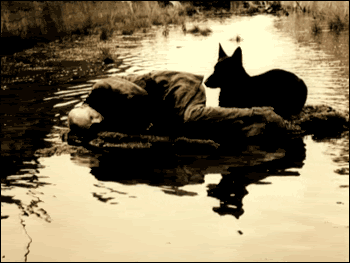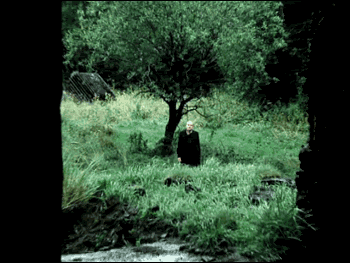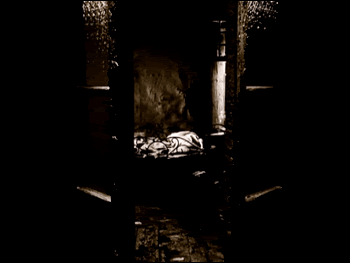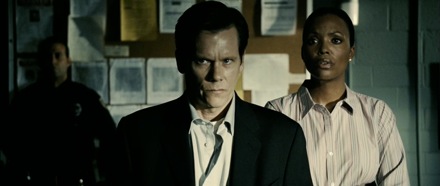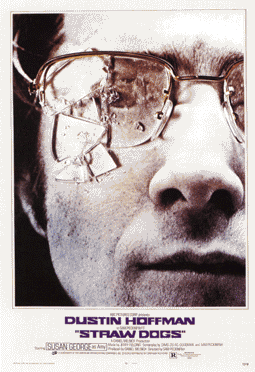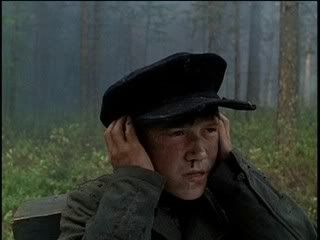
In 1959 director Robert Bresson came out with an eminent character study known as Pickpocket. It was a restrained, tightly controlled look at the psyche of a man who suffered from social disconnect, whose only form of social interaction was picking pockets in the streets of Paris. Soon after Pickpocket made its way to America, a young film student, Paul Schrader, discovered it - and thus the seed for the 1976 masterpiece ‘Taxi Driver’ was sewn. Young filmmakers of the 1970s were heavily influenced by the auteurs of the French New Wave, and since the studio systems in America were falling apart, the executives decided they might as well give these new, young filmmakers a chance to make the pictures they wanted. Bonnie and Clyde, The Graduate and Easy Rider paved the way, and soon young, independent filmmakers were making the films they wanted - with little to no studio involvement. During this time the young Paul Schrader - with almost no previous experience - wrote a script about a lonely man, a taxi driver. Influenced by his own experience with social disillusionment, books such as Nausea and most predominantly the aforementioned film Pickpocket, Schrader produced the script for one of the best character studies ever made in only a matter of weeks. He did not expect anyone to pick it up, but one thing led to another and soon director Martin Scorsese and the new but already famous actor Robert DeNiro were attached to the project. Taxi Driver was given a greenlite - and American cinema was never the same again.
Social Disconnect and Attempted Integration
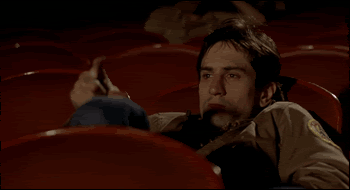
The film revolves around a lonely man named Tavis Bickle; a Vietnam veteran who ``can't sleep nights,’’ and has absolutely no purpose or drive in life as he drifts aimlessly through New York. He says, ``I ride around most nights - subways, buses,’’ but figures, ``if I'm gonna do that I might as well get paid for it.’’ Thus we first encounter Travis as he tries to get a job as an NY cab driver. “How’s your driving record,’’ asks the cab boss. “Clean. Like my conscious,’’ Travis grins. Right off the bat we can already tell Travis is a bit different. Taxi Driver’s overlying theme is social alienation; Travis realizes that he leads a meaningless existence, floating through New York like he didn`t even exist, disconnected from society. He sits in porno theatres for hours but finds himself completely unstimulated and unaffected by them. He tries to talk to people, but it`s all in vein because he doesn’t actually know what to say or how to communicate. Any attempt to make contact and join with society fails. At one point, as he is entering a porno theatre, he tries to strike up a conversation with one of the female clerks. She doesn`t even look at him as he fumbles about trying to ask for her name. What does Travis think he is doing? He is going into a porn theatre, what sort of chance does he think he has with this girl? Travis’s attempt to ‘make contact’ predictable falls apart. He resigns to buying some popcorn and a chocolate bar.
Travis is an alien creature trying to exist in a human world. He does not know how to interact with people, and the only form of socialization he experiences is through limited ‘social’ activities; riding on a bus or subway or by sitting in porn theatres. Other than that, he is completely alone. He simply does not know how to interact with society. Travis says, “I don't believe that one should devote his life to morbid self-attention, I believe that one should become a person like other people.’’ He believes he should conform with society; blend in - be ‘normal’. But he can’t seem to figure out how. He decides to become a cab driver because he figures if he might as well be paid for drifting around the city. But really it is an attempt at joining ‘society’, because as it is society is a building with a window with him on the outside looking in. Removed, but attempting to find his way in.
The problem is that Travis, in addition to not knowing how to interact with the world, also doesn’t know how to react to it. The images in the theatres are unfocused blurs. He stares into the distance, boring holes through the screen, probably not even aware of what he’s watching. A homicidal maniac (played by Scorsese in a brilliant cameo) has Travis pull the cab over as he explains his wife is cheating on him with a black man, and that he is going to kill her with a .44 magnum. This seems to have absolutely no emotional impact on Travis what so ever. His expression barely changes, and he says nothing in response to the raving maniac. He doesn’t even look at him in the rear view. Nothing seems to ‘register’ with Travis. Throughout the entire film Travis seems distant and removed from his world. When people talk to him they have to repeatedly say his name just to get his attention. “Travis. Travis... Travis!” And even something as simple as a pill dissolving in a glass of water is enough to completely remove him from the conversation. Travis is a man who does not know how to react to his environment, and doesn’t know how to react to other people. Even the violence he sees on the street seems to elicit little emotional response in him, and later in the film after he shoots a robber dead he leaves with the milk still in his arms, unmoved by the fact that he just killed a man.

So Travis does not how to interact with nor does he react to his surroundings. But he also does not understand them or his world. Travis is naive in his perceptions of everything around him. As he begins driving his cab, he begins to see more and more of the underbelly of society - but he begins to think that everywhere is like that. He specifically chooses to drive in those areas because he has become obsessed with them. He hates the filth of the city and wishes a “rain [would] come and wash all this scum off the streets.” But he doesn’t seem to understand that he is focusing all his attention in negative areas and therefore is going to see negative things. “All the animals come out at night - whores, skunk pussies, buggers, queens, fairies, dopers, junkies, sick, venal.” He begins to think that this sort of environment is the world; his vision becomes narrow and obsessive – even pathological. The psyche of Travis, however, does not understand how this could be. His perception of the world has always been that it is a good place; a sort of white washed 50s delusion of sorts. He has little understanding of the real world; he says he ‘doesn’t know much about politics’ or ‘movies’ or ‘music’. He is almost a childlike in his understanding of anything.
That is when he picks her out of the crowd. “She was wearing a white dress. She appeared like an angel. Out of this filthy mess, she is alone. They... cannot... touch... her...,” he narrates while the camera pans across his diary with the same words (a throwback to Pickpocket). For him she is perfect and angelic, the complete opposite of the scum he sees on the street. He’s instantly entranced with her, not because he loves her, but because he sees her as a sort of ‘solution’ to the filth, or at least that she can rescue him from it. But he does not seem to understand that that she is a fantasy, an apparition. He projects onto her what he believes a perfect person should be. At first he parks outside the campaign headquarters for ‘Palantine for President’, which she slavishly volunteers at, and just watches her during his lunch break. He builds an idea in his mind of what she is like, how perfect she is. Eventually he decides to walk in and ask her out. It is a bold move, considering he was basically stalking her. Again, Travis has absolutely no idea how to act in society, and he really sees nothing wrong with his approach. Perhaps out of sheer morbid curiosity, Betsy actually accepts. But Travis was upset about Betsy’s friend Tom who she was laughing with as he came in to meet her. To Travis Tom was a joke - an inconsequential blip on the map. Of course, Travis fails to realize that he is just as small and unimportant as Tom, because he has already begun building himself up as a ‘hero’ who is above everyone else. But that will come into play later.
Travis ends up failing to have any real conversation with Betsy, though. He can only complain about how silly that man she is friends with is. He tries to ask something different (where she is from) but as soon as she’s answered he obsessively goes back to Tom. Travis’ narrow perception of the world makes it impossible for him to accept that the perfect angel he has built Betsy out to be is actually quite dull, boring and ‘ordinary’. They have absolutely nothing in common, but Travis is terrified of loosing what has become his last bastion of hope. He becomes obsessed with Palantine, who she worships and devotes her life to. He has absolutely no conception of what Palantine actually stands for, but because he believes Betsy is ‘perfect’, Palantine therefore “must be good”. But Travis is never able to understand the politics, and like everything else, he remains distant, unable to connect. In a last ditch effort to form some sort of connection with her, he brings her to a porno theatre. It’s the only thing he really knows; the only ‘social’ place he is comfortable with. But Betsy is immediately repulsed and storms out in anger; it is a wonder that Travis expected anything different to have happened, but again he really has no understanding of how other people behiave, and he ends up devastated.
The brilliant Bernard Herrmann score for Taxi Driver perfectly illustrates the duality that Travis created in Betsy. As the film opens you have the beautiful, romantic jazz (which becomes Betsy’s theme), and on the other hand you have the dark, ominous drum beats which seems to perfectly embody the darkness of the film. Both are juxtaposed with each other in the jarring opening sequence, each sharply interrupting the other as if in eternal battle. But later in the film, this sharp distinction can be applied to Travis’ relationship with Betsy. On one hand she is the beautiful, perfect angel that he’s made her to be in his fantasy world, but on the other he begins to realize she is actually like the rest. “Let me tell you something. You're in a hell, and you're gonna die in a hell, just like the rest of 'em!” he yells at her. His world has been shattered. His attempt to interact with society has failed. His attempt to integrate with society has failed. His attempt at understanding the world has failed. And Betsy, the one he saw as coming down to save him from the filth, turned out to be no different than the rest.
Loneliness and Disillusionment
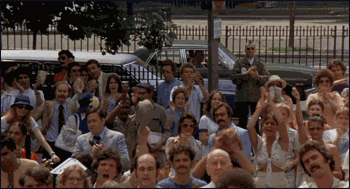
Where's Waldo? Travis is even physically and visually distant from society.
At this point in Taxi Driver, Travis shifts from the social disconnection that he has been trying to deal with to social alienation. During the first act of Taxi Driver Travis, is removed from the world, but he attempts to enter it through Betsy. He attempts to ‘make contact’, so to speak, and integrate himself like everyone else. But he fails; Betsy (i.e. society) reject him. Now, instead of trying to join society, he removes himself from it completely. Society has alienated him and he sees grows to hate it entirely, with no interest in partaking in it any longer. Many people say Taxi Driver is about loneliness, which is true, but for much of the film Travis has imposed loneliness on himself. He now does nothing but roam the streets of New York in a cab by night, and sit in his room by day. He stares blankly into the television, a glaze in his eyes. Once again he has no meaning, purpose, or direction. He is obsessed with his hatred of the outside world, and retreats to the ‘safety’ of his cab and apartment, severed from the world. But then he comes across Iris.
Iris is the opposite of who he made Betsy out to be; Iris is a 12 year old prostitute drug addict runaway. Iris is basically the definition of the scum that Travis hates; she is one of the “animals [that] come out at night.” But in Travis’ fantasy world, 12 year old girls should be playing with dolls and going to school. Granted, they should be, and Taxi Driver certainly isn’t saying 12 year olds should be whores,but we all know that in reality there are child prostitutes. But Travis cannot accept this, and finally he has purpose in life again. Before his goal was Betsy; he wanted her, but could not have her. Now his goal is Iris; he can have her, but does not want her. But he does want to remove her from her environment, somehow saving her and vindicating himself, at least in his conscious mind. Since Travis has entered a state of deep social alienation, he is looking for a way to destroy that which does not accept him. Iris represents a complacent, dark society that he tried but failed to enter. In Travis’ mind, if he removes Iris from her circumstances and changes her, he will have effectively ripped a cosmic hole in the very fabric of society. It could be seen as Travis deciding to do something ‘good’, but I see it as Travis deciding to destroy that which he has grown to hate.
Now Travis has a goal; purpose, drive, motivation. He “gets organized.” “50 push ups every morning...no more destroyers of my body.” In a brilliant montage by Scorsese we see Travis getting into shape, vowing to take complete control over him body. He goes out and buys a series of guns in the now famous scene where he buys four pistols including a .44 magnum (hmm, didn’t we meet someone else who was talking about one of these?) Back at his apartment he shines his boots, creates contraptions for his guns, and prepares the bullets for an inevitable battle he seems to think is coming. He looks at himself in the mirror, talking to invisible people he believes he might get into a confrontation with. “You talkin’ to me? You talkin’ to me?” He is building himself up to be an intimidating individual, at least in his mind, and the way he seems to be putting on a dress rehearsal for violence seem to indicate he thinks of himself as sort of cowboy hero.
Now he believes he is prepared to rescue Iris. He goes to her pimp, played by a startlingly convincing Harvey Keitel, and pays for time with her. Travis is shocked with how promiscuous Iris is, but this only hardens his resolve. He tells her he has gallantly arrived to rescue her, but is surprised that she doesn’t want to be rescued and that she actually looks up to ‘Sport’ the pimp as a sort of father figure. He only leaves after they agree to have breakfast the next day, but he clearly was caught off guard by her demeanour. The next day during breakfast, Iris explains how Sport is there to protect her from herself, and how she doesn’t mind what she does. Travis does not understand, because once again this does not fit into his perceptual box of what a 12 year old should be like. And he also is confused with how she refuses any help. Travis ran in like a knight in shining white armour, but he leaves having accomplished nothing and once again feeling rejected. Betsy rejected Travis and now Iris rejects him, choosing a pimp over him.
Travis spirals into depression once more. He sits in his apartment brandishing his guns, staring endlessly at the nothingness of the television. He puts his foot on the TV stand and ever so slowly pushes it until the TV crashes to the ground and breaks - his last connection with society shattered. He is all alone. He is “God’s lonely man.” But old posters of Palantine still plaster the walls of his apartment; a cold reminder of Betsy and a symbol of a detached, hypocritical society that refuses to accept him. Travis now decides to assassinate Palantine - the father figure of Betsy and a singular personification of a society. Travis shows up at a Palantine rally. The camera focuses on his body but does not reveal his face; Travis opens a pill bottle, spills a few in his hand begins to bring them up to his mouth - the camera rushes up to his head. He now sports a shocking mohawk. He grins ominously from the edge of the crowd, clapping mockingly as he waits for the speech to end.
Destruction
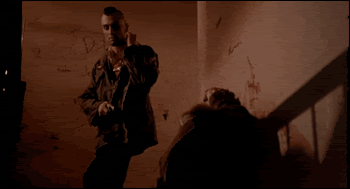
Interestingly, Palantine’s campaign slogan is “we are the people”, yet during all of Palantine’s speeches there are armed police officers and secret service separating the politician from the masses. The way Scorsese shot Taxi Driver really is brilliant because even through the visuals we get a sense of social disconnect, and in addition to a visual distance between Palantine and the crowd, there is a striking visual distance between Travis and the crowd. Travis is out on the fringe, physically distant from everyone else. He wears a beat up army jacket, dark sunglasses and now has a mohawk. When the people clap he waits and joins in several seconds later; but his clap is at a different rhythm, separate from everyone else’s. Everything about Travis now stands out, and he is physically and emotionally independent of the world around him. At first he was rejected, but now he chooses to be alone. He deliberately removes himself – even physically – from society. He doesn’t want to be a part of it any longer. At this point, he wants to destroy it. Travis moves in to pull his gun to kill Palantine – the ultimate act of hate - but he stands out in the crowd much too clearly and the secret service chase him away. His first attempt at physically attacking society has failed.
Travis rushes back to his apartment to collect himself. He failed at destroying one ‘father figure’ representation of society - but quickly moves onto the next. If he can’t destroy Palantine, a phony politician who mirrors Betsy (shiny and perfect on the outside, but rather shallow and fake on the inside) and her rejection, then he will destroy Sport and the other pimps, who represent the underbelly of society which Iris chose over Travis. He speeds over in his cab and walks up to Sport. Travis is so different in his appearance and the way he carries himself that Sport doesn’t even recognize him. “How’s the pimp business?” Travis mocks before shooting Sport in the gut. He moves onto the apartment building where Iris works in and sparks a brief but explosive gun battle. Travis shoots a man’s hand off with the magnum, but Sport is not dead – Travis is shot in the neck, but still stands and finishes Sport off with the rest of his ammunition. Travis moves upstairs and is caught off guard by another gangster. He is shot in the arm, but manages to shoot the man in the face with far more bullets than necessary. “I’ll kill yeah! I’ll kill yeah!” a wounded pimp screams as he tries to attack Travis as Travis limps into the room where Iris is cowering. Travis stabs the pimp in the hand and then shoots him in the head, brains splattering all over the wall. Iris is huddled on the coach, her cries piercing the sounds of violence, Later a strange silence overcomes the building. Travis points a revolver at his head and pulls the trigger. Click, nothing. He takes an automatic. Click, click. Nothing. He slumps on the coach as the police arrive.
The haunting Herrmann creeps in and Travis locks eyes with the camera. He takes his hand which is dripping with blood and points it at his head like a gun. “Peuuuhhh...peuuuhhh...peuuuuhhh...” The brilliant Scorsese cuts to a camera looking down from the ceiling. We slowly begin to crawl away from Travis... across the room, we drift down the hall... Soon we are in the corridor and observe the silent aftermath of all the violence. Now we are outside and the camera cranes higher and higher looking down on the growing crowd of police and onlookers. Travis chose Palantine and Sport as representations of a society that did not accept him as well as a society which he perceives as scum and filth. Saving Iris may have been his way of somehow cleaning up the streets, but I think on a deeper level Travis resented the fact that Iris chose Sport over him, and the final act of violence was actually a selfish act of revenge -not a selfless act of heroism.
None-the-less, Taxi Driver cuts to months or years later and the camera pans over a clipboard filled with newspaper. A voice over recites a letter posted on the board from Iris’ parents, thanking Travis for rescuing her. The various newspaper clip headings reveal that the media made Travis out to be a hero and that he has made a full recovery. Soon we see Travis again, back with his normal haircut and normal clothing, and back to driving a cab. He is chatting with some other cabbies when he realizes he has a fare; he hops in the cab and begins to drive, but realizes his fare is actually Betsy. They have a ‘normal’ conversation with each other - more normal than any they had before. Travis refuses her money and bids her farewell, driving off. Travis seems to be ‘okay’ now. But as he is driving off there is a strange ringing sound and his eyes shoot to the rear view mirror. Nothing. Nothing is there. But apparently Travis is still a disturbed individual. A ticking time bomb of social alienation which could explode at any moment.

Another interesting thing about the epilogue is how the media apparently made him out to be a hero. Taxi Driver questions how easily the media is capable of turning a man into a hero or a villain. After all, was Travis really a hero? No. He shot all those pimps because Iris chose them over him. And had Travis been successful just a couple hours early and killed Palantine, he would have been the villain. It is not a big part of the film because this media exploitation is only explored during the last five minutes, but it defiantly makes you question the way media can so broadly paints people as either heroes or villains. Travis was made into a hero, but he most certainly was not one.
But it seems unfair to have such an expansive review of Travis and the themes of Taxi Driver without mentioning the art of the film. Paul Schrader’s script is obviously a masterpiece, as we have explored, but there is also Scorsese and DeNiro to consider. Scorsese gives such a unique vision to the Schrader script and he shoots in a way that screams of ‘alienation’. Travis walks one way and the camera pans the other way to meet him later instead of tracking with him. Travis speaks on the phone and the camera slowly drifts away, studying an empty corridor. Scorsese gives Taxi Driver a brilliant visual atmosphere which perfectly embodies the themes and character of the film. DeNiro is Travis Bickle. In what is DeNiro’s crowning performance, and what I believe to be one of the best performances of all time, he breathes life into the character like no other actor could have. Every movement, every pause, every blank stare – perfectly timed, perfectly honed. The performance is something you cannot deny having a major impact on acting and cinema. Overall, the Scorsese/DeNiro/Schrader team are an incredible blend of talent. Schrader allows us a startling examination of the psyche of a disturbed man. Scorsese provides a brilliant visual context for Travis to exist in, and his work with the camera, editing and the great Herrmann score allowed for Taxi Driver and Travis to be fully realized. DeNiro took the fascinating character of Travis and blew everyone away with his performance. DeNiro became Travis, and again, the performance is one of the best I’ve ever seen committed to the screen.
But even with all this artistic talent and brilliance, Taxi Driver is still the best character study – and indeed, my favourite film– ever made because of the character of Travis. He is an absolutely fascinating, enigmatic, and intriguing character. Like Pickpocket, I can watch Taxi Driver over and over again because I always find something new while studying the characters of each respective film. In Taxi Driver, the overall theme of social alienation and the three stages Travis goes through (1. social disconnect & attempted integration, 2. loneliness/disillusionment, and 3. destruction) prove to be endlessly compelling subjects. I believe the film is extremely intelligent on a number of levels, and many I did not even touch base on (paranoia or racism, for example). Taxi Driver is made of many layers, and each layer delves deeper and deeper into the world of Travis Bickle; each level saying something different - something insightful and perceptive. I’ve always felt that character studies and films that focus on society and alienation had the most influence on me. In that sense, Taxi Driver is the film that embodies everything I love about the character study and cinema itself. Each time it grows on me a little bit more, and I learn something a little bit different about Travis. It’s a complex labyrinth of themes and subtext, but ultimately Taxi Driver is Travis Bickle... an endlessly fascinating enigma of the human psyche. A puzzle of social alienation and personal exploration. A cinematic, Dostoyevskian masterpiece the likes of which has never been seen, and perhaps, never will be seen again.
